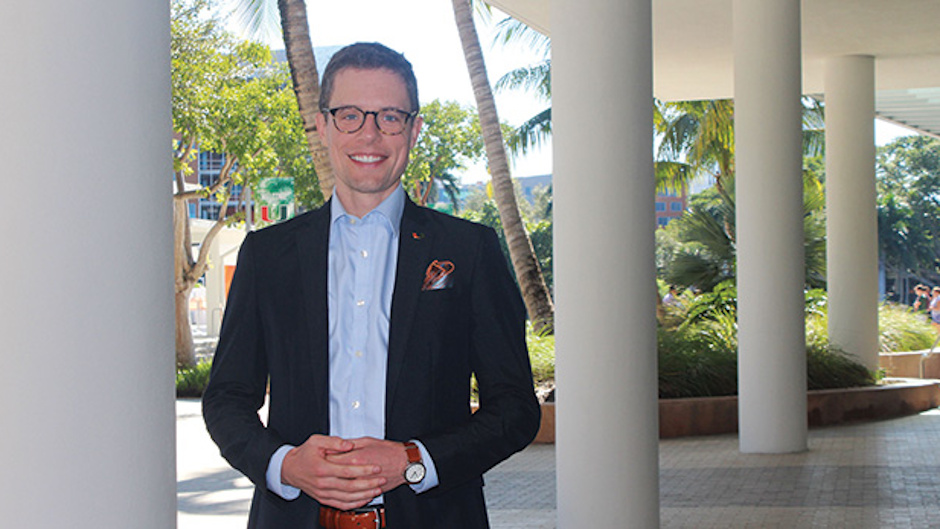"Free: the world's most dangerous price," he begins.
The speaker is John Mark Newman, Miami Law's new antitrust professor. He possesses the gift—some would say power—to explain very complicated and nuanced subjects in a form that most anyone can grasp.
For the next 11 minutes and 13 seconds, Newman delivers a devastating analysis of market forces and our online lives, comparing convincingly our obsession with our devices with drug addiction, to a sold-out house at the Halloran Center in Memphis.(Hint: he carries an old school flip phone).
Few of his friends growing up would have predicted Newman would become a world-traveling, anti-appster star of the TEDx stage. He grew up in a small town in Iowa. Well, not actually in, more like near, since his family's farm is located outside of the village proper. Newman's dad explored a lot of different careers—everything from auctioneer to high school physics teacher—before going to law school at the age of 43. Young John Mark raised and sold chickens for pocket money, while his parents ran the solo law practice.
After Newman was named a National Merit Scholar, the local newspaper asked about his career goals in an interview.
"I said I wanted to be an English professor," Newman says "so I actually got pretty close to that. I am kind of a grammar nerd but then I found out that English professors don't actually teach usage. So I switched to law, where word usage is still extremely important."
Very few people in his Iowa family's orbit had ever visited either coast much less traveled outside the United States. John Mark is the only Newman to have moved out of Iowa and has now delivered speeches to audiences across five continents, including his recent keynote speech at the Digital Citizens Conference at Melbourne Law School in Australia—heady stuff for a guy who grew up pre-internet.
"We were in the middle of nowhere Iowa, and a kind of a cultural desert," he says. "I had no one to tell me that Hunter S. Thompson is great or you should listen to Bob Dylan. My reading path was very weird and based on what was available in the local library. Everything was shelved in alphabetical order, so I went from Voltaire to Vonnegut. Now there are algorithms to tell us what to read and watch," he says. "The most impactful invention during my lifetime is probably social media.
"But in terms of the greatest force for good? The cynic in me would say we haven't invented anything that's substantially improved the world in the last twenty years," he says. "I more and more question whether the Internet has been a force for good. As information becomes super abundant, it consumes something and crowds out something else. The thing it consumes is our attention. The thing it crowds out is deep, reflective thinking, which helps explain why the tone of discourse has nosedived in the last 10 years. And products like Twitter just suck you in. A lot of really nasty things have happened to humanity because of it."
Although Newman's work involving digital technology touches on a variety of legal fields, his specialty has long been antitrust law.
ANTITRUST EXPERT
"I really fell in love with antitrust during law school," Newman says. "I had an amazing professor who was able to explain why it matters so much, even though it can seem somewhat dry or technical. Antitrust is all about how we allocate power in society."
When he started out practicing and writing about antitrust, very few people had even heard of it. The government's lawsuit against Microsoft in the late 1990s was a high-water mark, followed by years of little to no action. At the same time, the field became more and more technocratic and closed-off to outsiders. But the rise of a new generation of Silicon Valley giants would soon change that.
"I wrote my first paper about antitrust and digital markets way back in 2011," Newman says. "Back then there was just a tiny handful of people thinking about what kind of power might be wielded by new companies like Apple, Facebook, and Google."
As those companies have continued to grow, antitrust has become more relevant than ever. Presidential candidates bring it up on the debate stage, national news outlets devote airtime to it, and public interest has continued to grow.
"It's great to see," Newman says. "There are so many new voices being heard. There's never been a more exciting time to get involved in these issues, whether that's as an attorney, lawmaker, or just a concerned citizen."
Newman received his J.D. with highest distinction from the University of Iowa before moving to Washington, D.C., serving as an Honors Program Trial Attorney with the U.S. Department of Justice Antitrust Division. While there, his primary focus involved civil antitrust litigation, analyzing the competitive effects of mergers and acquisitions, and investigating potential antitrust conduct violations. He also maintained an active pro bono practice, representing low-income tenants in litigation and alternative dispute resolution.
Newman comes to Miami Law from the University of Memphis School of Law where, as an Assistant Professor of Law, he specialized in the economics and regulation of digital markets and platforms, with a particular interest in antitrust, contract law, and intellectual property issues.
"I'm so excited to have the chance to work with Miami Law's rock star colleagues, teach our amazing students, and become part of this storied institution," Newman says. "I'd love to complete a book project over the next few years, although I'm not sure anyone still reads books these days."

